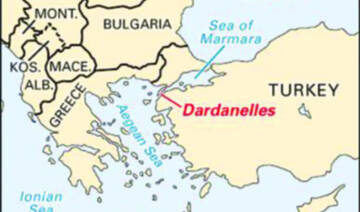BEIRUT: A woman entered a bank in Lebanon on Wednesday brandishing a gun, poured gasoline over herself and demanded that she be allowed to withdraw her savings. She left with $13,000. It later appeared that the gun was a toy.
It followed a similar incident earlier in the day in Aley. Access to funds held in Lebanese banks has been heavily restricted for some time as the country is in the midst of a long-running financial crisis.
Both incidents were greeted with widespread sympathy and support from the public, especially from other frustrated depositors.
Sali Hafiz, wearing black clothes and with her face uncovered, entered the Sodeco branch of BLOM bank in Beirut, across from the headquarters of the security forces, accompanied by activists from the Depositors’ Outcry Association and a lawyer.
She pulled out what appeared to be a gun, stood on a table and doused herself in gasoline from a bottle. She threatened to set herself and the bank on fire if she did not receive her and her sister’s joint deposits of about $20,000. She said her sister has brain cancer and they need the money to pay medical bills.
It appeared that Hafiz’s 23-year-old sister, Nancy, was in a car parked outside the bank with her husband, who was driving. She seemed to have lost her hair and her body appeared feeble. She could not walk and had difficulty speaking.
When Hafiz poured the gasoline over herself in the bank it sparked panic among employees and customers, and screams could be heard. As people clamored to get out they broke down a glass wall and fled.
Video footage filmed by the activists accompanying Hafiz show them demanding she receive her savings and telling staff to open cash boxes. One of the boxes contained $6,300 but Hafiz refused to accept this amount and demanded all of the money in her account. Eventually she was given $13,000 and left the bank without being stopped by security.
A small team of internal security officers arrived later and arrested some of the activists close to the bank where they were protesting against the banks and the governor of the central bank, Riad Salameh.
Later, in a TV interview, Hafiz said she is not a thief and had not harmed anyone. She said she had been forced to take action because her sister was dying.
“She needs an expensive injection daily for her treatment,” she said. “I went to the bank two days earlier to present the issue and asked the bank manager to give me the deposit to cover the cost of the treatment but he offered me just $200 a month, which was not enough for one injection per day.
“At home, we sold all our valuables to cover the cost of my sister’s treatment and I almost sold one of my kidneys to get some money. The deposit in the bank was saved by me and my sister from our work and it is held by the bank.”
She said that the money she took from the bank had been filmed by CCTV cameras so “we would not be accused of theft.”
Hafiz added: “I reassured the bank employees that I did not want to harm anyone but, rather, I wanted to save a human being. The weapon in my possession was one of my nephew’s toys.”
Her family lives near the branch where the incident took place. Her mother told Arab News: “My daughter, Nancy, almost committed suicide because she gave up on life. Sali could not stand seeing her sister suffer. We did not take money that was not ours. They refused to give us our money, so Sali resorted to what she did.”
Nancy described her sister as a “hero.” Other Lebanese said Hafiz “is strong and we are with her.”
In a separate incident on Wednesday, a young man called Rami Sharaf Al-Din entered a branch of Bankmed in the city of Aley. He reportedly threatened employees but, according to officials, members of the security services intervened and arrested him.
The incidents come a month after depositor Bassam Al-Sheikh Hussein held staff at a bank in Beirut hostage to get his savings so that he could pay his father’s medical bills. In the light of such events, bank employees are said to be considering going on a strike.
BLOM Bank said that the incident at its branch on Wednesday was a “premeditated and planned operation with the intent to harm.”
George Al-Hajj, president of the Federation of Syndicates of Banks Employees in Lebanon, told Arab News: “So far these incidents are happening without any bloodshed. However, the question is how is this dilemma going to be resolved?
“Going on a strike is not a solution but a loss for the country. Depositors have the right to receive their deposits. Bank employees are also depositors. Three years have passed and this dilemma is yet to be solved.
“They discuss the capital control law but do not approve it. They propose a plan to restructure banks. However, they do nothing. With every passing day, the crisis is worsening, losses increasing.”
He added that the federation is keen to “preserve the presence of bank employees or else they will lose their jobs. The break-ins happening are affecting all depositors and their money. It is important that the bank sector remains the safety valve of the Lebanese economy.”
Hassan Moghnieh, head of the Association of Depositors in Lebanon, told Arab News: “We do not encourage bank break-ins but failing to address this intensifying crisis, and dealing with people’s money with recklessness, might push many depositors to take this step as restitution, rather than theft or assault.”

























